Why anarchism in Makhno was reborn in the kulaks
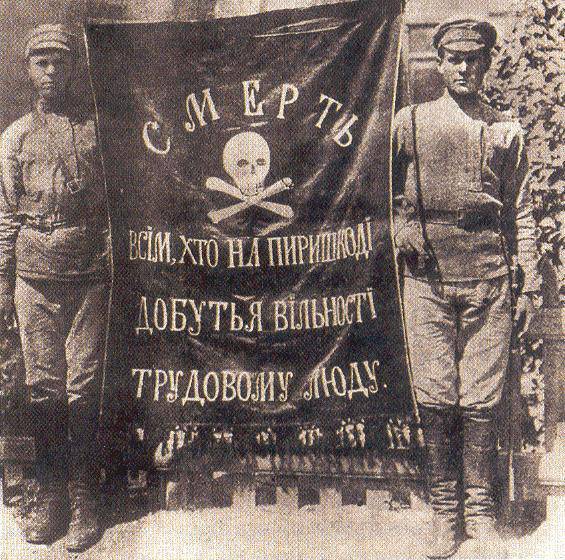
In 1919, anarchists seized control from Makhno, and began to determine the ideology of his army. Starting with the propaganda of anarchy and repulse to the Bolshevik soviets, anarchism there gradually degenerated into bureaucracy, arbitrariness and tyranny.
Bolshevik Yakov Yakovlev (Epstein), Chairman of the Yekaterinoslav Provincial Committee of the Communist Party (Bolsheviks) of Ukraine, in the magazine Krasnaya Novy, No. XXUMX, 2 year (p. 1921-243) describes why the experiment of building an anarchist republic in the territories controlled by Nestor Makhno failed :
“The Makhno movement emerges in 1918 year, as a rebel movement against the regime of hetman and German imperialism in Ukraine. Makhno first appears then as the leader of the peasants rebelled in the Gulyaypole region. Makhno inflicts a series of beats on white. Makhno disorganizes the rear of the whites.
At the end of the year 1918 Yekaterinoslav white United were knocked out blow Makhno and Ekaterinoslav workers. Workers, the vast majority of the Bolsheviks, acting together with the Makhnovists, did not yet suspect that they will soon be anarchists.
But already with this major success of Makhno, the weak side of the Makhnovshchina as a partisan and peasant movement is revealed. Several thousand of the Makhnovists, who entered the city, flood Yekaterinoslav with a wave of drunken revelry, reckless drinking, banditry, robbery and pogroms. All the efforts of the best Yekaterinoslav workers to cope with this partisan-peasant element lead nowhere. The Ekaterinoslav Revolutionary Committee is unable to introduce any kind of order and organization into the Makhnovist ranks. As a result, several hundred Petliurists took Yekaterinoslav almost without any loss. The losses of Yekaterinoslav workers turn out to be enormous: brutal White Guards deal with the rebels violently; before 2.000, rebel workers were drowned in the Dnieper while trying to escape.
In January, Yekaterinoslav was taken by the Bolshevik troops. The Red Army a week passed the area occupied by Makhno and moved forward to the Black Sea and east to Rostov against the whites.
It is obvious that under these conditions the role and significance of the guerrilla groups of Makhno change completely. In the direction of the gradual entry of the Makhnovist units into the Red Army, the work of the Soviet command was developing.
The guerrilla leader, Makhno, cannot, of course, reconcile himself to such a decision. The leader of the partisan, who had already turned into Makhno, sabotages, disrupts the unified organization of the army, unified command, and unified supply with all possible measures and methods.
At this moment, Russian and Ukrainian anarchists come to the rescue of Makhno. Of the various anarchist groups that linked their fate with the Makhnovshchina in subsequent years, one of the largest anarchist organizations — the Nabat group — stands out.

This group organized in November 1918, in Kursk, at a small conference of representatives of anarchists of various trends. Finally, it took shape at the I Congress of the Confederation of Anarchic Organizations of Ukraine “Nabat” in Elizavetgrad in April 1919. Most of the organizations included in the Nabat confederation are anarcho-communists, but at the same time a number of anarcho-syndicalist groups also joined it.
In resolutions and resolutions of both the November Conference and the Elizavetgrad Congress, a sharply negative attitude towards the workers' state is minted.
The starting point of this relationship is a kind of “anarchic maximalism”. Kursk Conference recognizes, for example, that "the Ukrainian revolution will have a significant chance to quickly become a true social-anarchist."
The conference denies the need for any transitional period to a powerless anarchic society, denies the need to organize the proletariat into the ruling class during the transition from capitalism to socialism ...
A practitioner and partisan sitting in the same embattle makes a logical conclusion: “If you can make this direct transition from the bourgeois kingdom to an anarchist society in Russia under specific Russian conditions, the Communist statesmen who organized the proletariat into the dominant class are obviously the main obstacle to this transition. and not wishing, in spite of the interests of the working people, to immediately abolish Soviet power and go over to a powerless society. ”
Hence the slogan of the Elizavetgrad congress: "No compromise with the Soviet government."
Kursk conference that took place during the occupation of Ukraine by German troops, the attitude towards the Soviet government formulates a rather vague:
"The anarchist must constantly and stubbornly campaign for the creation, instead of the present Soviets, of true Soviets of workers and peasant organizations, non-partisan and powerless, genuine, uniting local organizations in enterprises and villages and really capable of organizing the new system."
Next, from the resolution:
“In view of the fact that the so-called“ Councils of Deputies ”have now finally and universally turned into political bodies of democratic parliamentarism, resting on the basis of power, statehood, administration and deadening centralization from above, the congress speaks definitively and categorically against the inclusion of anarchists in them.”
The Nabat Group cannot be refused in a large logical sequence. If there is no transitional moment from the bourgeois capitalist system to anarchist communism, but there is a direct construction of the anarchist commune itself, if the organization of Soviet power became on the way to this anarchist communism, if the Soviets and the rest of the workers-peasant organizations cannot serve the cause of creating an powerless society, if a decisive struggle with a workers' state is unavoidable and necessary to achieve an anarchist ideal, then immediately it is necessary to find the forces that can l implement.
The Kursk Conference and the Elizavetgrad congress of the Nabat confederation see such a force suitable for the overthrow of the Soviet power and for the realization of the anarchist ideal in insurgency and, in particular, in the Makhnovshchina.
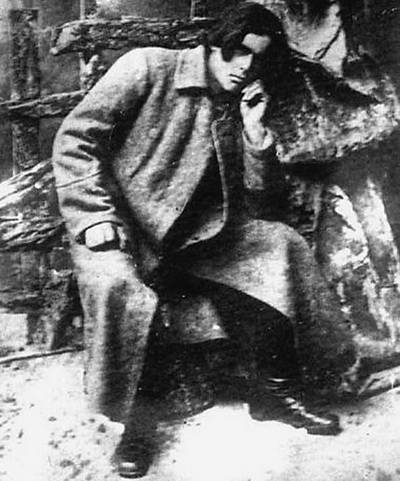
The Kursk conference, which takes place directly after the bitter experience of the anarchist work of the spring of the year 1918, is still relatively cautious. She refuses to create specially anarchist groups and recommends that anarchists join the common workers and peasant guerrilla groups. But at the same time, the guerrilla idealization is limitless, evidenced by at least the fact that the conference was going through rebel groups to "wake up in the population conscious sympathy with the anarchist idea and organization."
The factual conclusion of this is: orientation towards the Makhnovshchina with an attempt to immediately implement the anarchist ideal through the Makhnovist insurrection.
From the first days of January, the Anarchists organized the Revolutionary Military Council under Makhno and the Military Revolutionary Committee in Gulyai-Polya from their supporters. The Makhnovists, with all their measures, are being transformed from the partisans who overthrew the hetman into carriers of the anarchist ideal. The Makhnovists, as the natural defenders of anarchism, are invited by the Confederation of Labor to protect it from the attacks of Soviet power.
In Yekaterinoslav, where the name of the anarchists was tied to the crime of the spring of 1918, and the ridiculous death of hundreds of workers in December of 1918, in February of 1919, the anarchist Baron was not allowed a lecture. In response, the Nabat Secretariat 10 February 1919 of the year calls the Makhnovists to take action against Soviet power.
Anarchists accepted Makhno’s war against Soviet power as the embodiment of the struggle of the “free labor commune with the state police, the struggle of free peasantry against the state Bolsheviks” (“Nabat” No. 22, July 7 1919). Makhno learns anarchic lessons. The resolutions of the conference and conference in the Makhno camp are becoming more and more “narkhist, more and more often written off from Nabat, more and more often written by anarchists. With regard to resolutions, anarchists achieve great success in the Makhno camp - Makhno begins to describe any of his actions with quotations from Proudhon and Bakunin.
In April, 1919, Denikin launches successful attacks on Soviet Russia, occupies a number of cities and threatens Yekaterinoslav and Kharkov. Red troops fluttered. Since March, Makhno systematically does not carry out orders of the military command. 2 Jun. Trotsky writes an article about the Makhnovshchina where he says: "In the name of victory, it is time to finish and end firmly with anarcho-kulak debauchery."
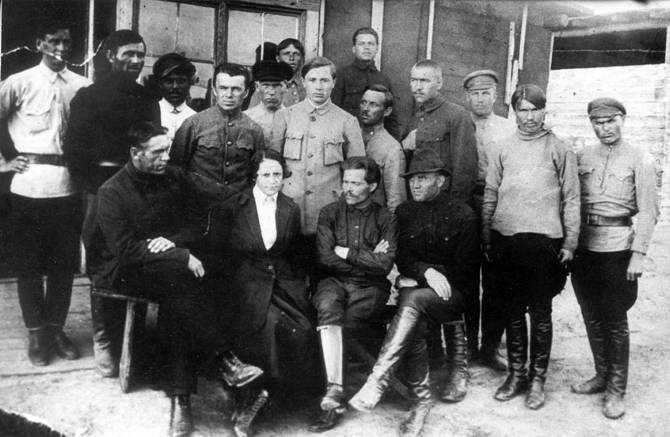
June 4 The Revolutionary Military Council issues, with the signature of Trotsky, Order No. XXUMX, which prohibits the Gulyai-Polish Congress, which Makhno gathered in front of Denikin to design his republic and which inevitably had to give a new insurrection in the spirit of Grigorievsky and the opening of the front with white.
In response to this order, Makhno actually opens the front to Denikin, filming with his units from the area they were holding. Makhno district without any losses captured by the White Guard cavalry Shkuro, and, thus, the white in a huge area go to the rear of the red troops.
It was enough for a few weeks potsarstvovat Denikin in the Ukraine, to excite against him the hatred of the mass of the peasantry. And Makhno, as it still retains some ties with the peasant masses, carried away by the elements of the peasant uprising, is compelled to turn his weapon against Denikin.
A huge part of Ukraine covers the peasant uprising. A typical peasant guerrilla war breaks out, today raising thousands against a landowner, tomorrow not able to put together a dozen, able to hurt the enemy, but not able to kill him, able to capture villages and cities, but not able to hold them, able to remove the enemy’s picket by night, but nothing not able to do with an organized enemy.
At the moment of strong pressure from the red from the north, the Makhnovists manage to occupy Yekaterinoslav. Anarchists about one and a half months were full masters of Yekaterinoslav.
They do not allow the organization of a “one-sided Bolshevik council” in Yekaterinoslav, they shoot in Yekaterinoslav 12 their own commanders headed by Bolshevik Polonsky, who tried to organize the Bolshevik council in Yekaterinoslav.
Workers Yekaterinoslav few months did not receive a salary from Denikin. They were looking for ways from starving to death in the anarchist-curfew republic. The Ekaterinoslav railway workers and telegraph operators of the Ekaterinoslav-Sinelnikovo line turn to Makhno with a request to support them, to give them food and money.
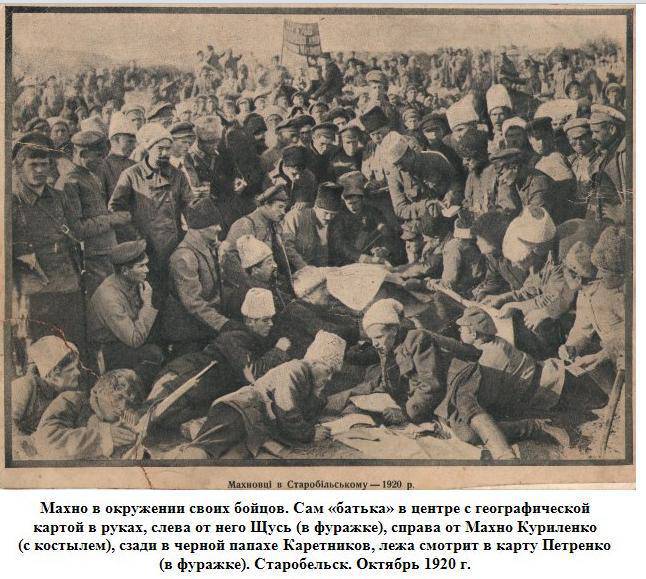
The answer they get is classic: we are not Bolsheviks, in order to feed you from the state, we do not need roads; if you need them, take bread from those who need your roads and telegraph.
At the Bryansk plant, workers repair an armored car for Makhno. Workers demand payment for labor. Makhno writes a resolution to their demand: “In view of the fact that the workers do not want to support the Makhnovists and demand too much for repairing the armored car, they’ll take the armored car free from them.”
After the defeat of Denikin by the Soviet troops, Makhno again falls into the area of operations of the Red forces. The Soviet command agrees to allow the existence of Makhno units under the condition of their reorganization and subordination to the combat orders of the red command. At that time, Poland’s attack on Soviet Russia was already marked: The 14 Revolutionary Military Council was giving 8 on January 1920 of the year Makhno’s order to immediately take the route Alexandria, Cherkasy, Borisopol, Brovary, Chernigov, Kovel.
On January 22, 1920, a meeting of the delegation of the 14 Army Revolutionary Military Council with the delegation of Makhno took place. The Soviet command tried to appeal to the revolutionary consciousness of the anarchist leaders of the army of Makhno. But Makhno put forward the old requirement of "preserving independence for his army", refused to carry out the military order to transfer to the Polish front and moved to the rear of the Red Army, fighting Wrangel and Poland.
For several months, Makhno was making a raid on the Aleksandrovskaya, Yekaterinoslav, Poltava, Kharkiv and Donetsk provinces, carrying out anarchic slogans of "free and powerless councils" and "free labor" along the way.
“To establish“ free soviets ”, it was necessary first of all to destroy the existing Bolshevik soviets. This side of anarchic construction was beautifully put in hundreds of villages and a number of district cities of Ukraine.
The anarcho-Makhnovists especially mercilessly dealt with the organizations of the peasant poor, seeing in them the organs of the proletarian dictatorship most dangerous for themselves.
"No Bolshevik power organizations." This idea was carried out anarcho-Makhnovists steadily. But to the extent that the Makhnovists had to create the appropriate bodies to control the occupied territories of the republic, and since at the same time the Bolshevik organizations of the poor and middle elements of the village were destroyed, the task of forming the authorities in the Makhnovist state was happy to assume the bourgeois village.
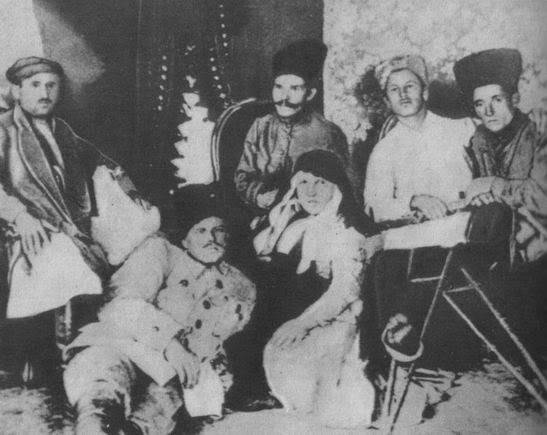
In the cities, the anarcho-Makhnovists replaced the Bolshevik one-sided advice with an even simpler recipe. Appointed autocratic commandant.
Anarchists attached great importance to the idea of electing in the army, opposing the Makhnovist detachments with the electoral commanders of the Bolshevik Red Army with the commanders appointed by the Soviet government.
V.Ivanov, who visited Makhno’s headquarters in 1920 in September, as the authorized revision council of the Southern Front, tells about what this election of the commanders has become. Here is a description of it, which was later not disputed by anybody from the anarchists:
“The regime is holid, the discipline is iron, the rebels are beaten in the face for the slightest offense, there is no election of commanders, all commanders, including company commanders, are appointed by Makhno and the anarchist revolutionary military council, the Revolutionary Military Council there is a "special department", cracking down on those who disobey secretly and mercilessly. "
“The situation with the idea of free economic construction and exchange is no better than with“ free advice ”and the election of commanders. Extracts from local food committees for 1920 year:
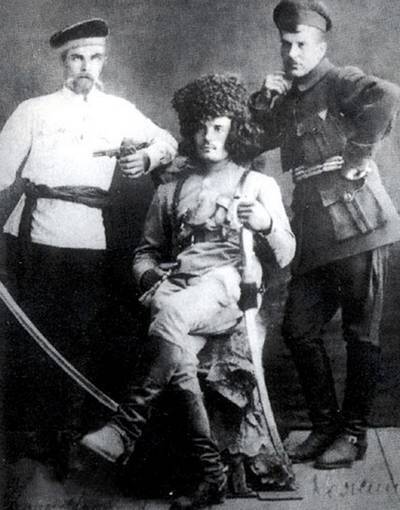
“In Izum, Makhno releases bread grabbed on the food committee to the market at 200 rubles. pud ... "
“In the Starobelsk district, Makhno distributes bread to the peasants at the dumping stations for free ...”
"In Zenkov Makhno distributes free sugar captured at a sugar factory ..."
"In Mirgorodsky district, Makhno distributes to the peasants the manufactories in the city for free, seized
The same is done with furniture from cities, with leather from tanneries, with iron, with gramophones, grand pianos, chairs and tables, pillows and dresses pumped free of charge from plunder cities to nearby villages.
In the Makhnovist units themselves, tired of the continuous unsuccessful and fruitless struggle with the Soviet power, ferment begins. The Makhnov generals from anarchism are in danger of becoming anarchic generals without a single soldier. The Makhnovist lower classes require an agreement with the Soviet authorities.
In October 1920, the Makhnovist Revolutionary Military Council appealed to the Revolutionary Military Council of the Southern Front to offer its services in the fight against Wrangel on the basis of operational subordination to the command of the Red Army. It is accepted.
Representative of the Soviet government of Ukraine Yakovlev and representatives of the council command Makhnovtsev Kurylenko and Popov signed an agreement on a political issue, according to which the Makhnovists and anarchists get the freedom to propagate their ideas, but without appealing to the violent overthrow of the Soviet system.
The Soviet government announced an amnesty for anarchists and Makhnovists for past actions, freed anarchists sitting there from prisons, and provided them with the opportunity to publish the Nabat newspaper in Kharkov, the secretariat body of the Anarchist Federation of Ukraine and the Voice of Makhnovts, an organ of the revolutionary rebels of Ukraine (Makhnovists).
The anarchists at this moment are so in solidarity with the Makhnovist Revolutionary Military Council that the leader and responsible representative of the political delegation of the army of Makhno is the anarchist Volin, one of the most responsible and well-educated leaders of Russian anarchism.
Anarchists of Kharkov take an active part in the strike of workers of a locomotive factory that took place in Kharkov at that time, having stopped work in the form of a protest against the decision of economic and professional bodies to combat absenteeism.
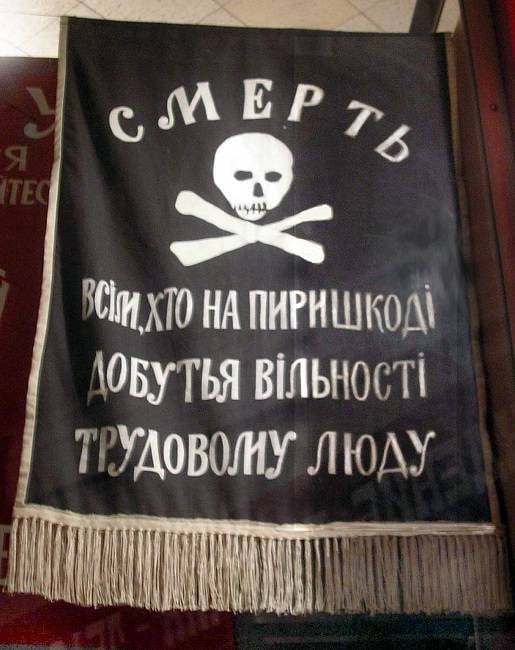
At the November 24 meeting, 1920, with the political delegation of Makhno, the representative of the Soviets, the Nabat confederation demanded a clear and precise formulation of its attitude to strike action against the workers' power and participation in the economic bodies of the Soviet Republic.
To these questions, the anarchist Volin answered:
“The strike is the business of the workers. If the workers started the strike, they must continue it until complete success. ”
"Not being a party and standing on the point of view of the true self-activity of the masses, the anarchists refuse to organize participation in the economic bodies of the republic."
On November 20, Frunze gives Makhno an order to move to the Caucasian Front. Makhno refuses to execute this order. Then, on November 24, Frunze, by order No. 00149, proposed to the rebel army's Revolutionary Military Council: “All parts of Makhno’s army should be immediately incorporated into the 4 Army, and the 4 Army Revolutionary Military Council is charged with reforming them.” With a appeal from the same number, the red command informs the fighters of the Southern Front that before November 26 it will wait for a response from Makhno.
Instead of answering, Makhno begins again hostile actions against the republic. Then, on the night of 25 on November 26, after Makhno found out his refusal to even respond to an order from the command, the political and military delegation of the Makhnovists and the anarchists of the Nabat confederation were arrested by the Soviet authorities in Kharkov.
Instead of the political social force of the Makhnovshchina, we now have a clever and talented bandit at the head of two or three hundred thugs. Anarchist idea also died. It is interesting to trace its genesis.
Having found themselves, to a large extent, in addition to their own consciousness in the role of leaders of the kulak uprising against Soviet power, the anarchists were forced to violate all their principles with their every step. They began their struggle against Soviet power in the name of the immediate implementation of a powerless society. They end up creating a state organization in the Gulyaypolsky Makhnovsky region, where all power was concentrated in the hands of strong prosperous peasantry, where the government of strong peasantry held its power with brutal violence against the worker and the poor peasant. The inexorable logic of the civil war led to the fact that anarchists-bezvarchniki who started the war with the workers' state for the sake of destroying the state in general, end up creating a kulak state whose anarchist government is not replaced and is not chosen by anyone for two years.
Anarchists refused to take part and recognize the advice, one-sided, organs seized by the party. They also rejected the Bolshevik councils in the name of free advice. And the same wicked irony of the civil war turns the bezvstransnikov into the commandants of the villages and cities captured by Makhno or the defenders of such commandants. In practice, they not only reject the idea of free advice, but in fact justify and support the concentration of all and military and civilian power in the hands of individual persons appointed by Makhno.
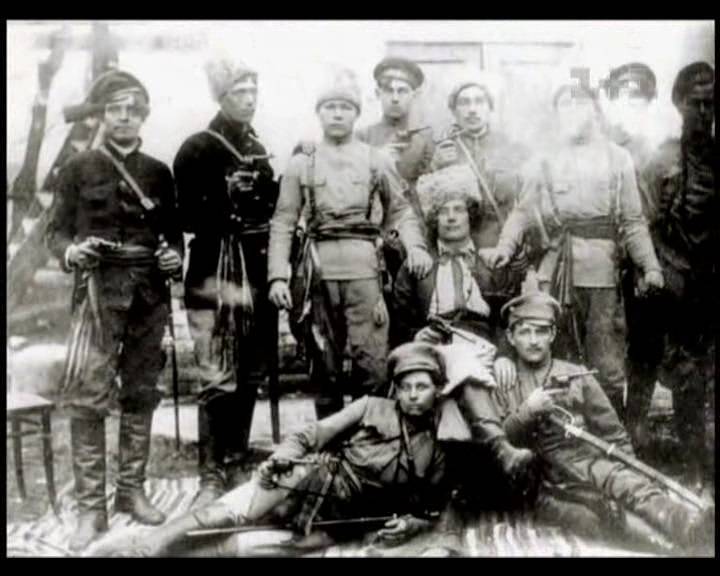
Anarchists began their struggle against the Soviet government in the name of the free guerrilla army with elective commanders. Set in the face of a number of enemies, they not only refuse in their army from the election of commanding personnel, but they bring the appointment, police brutality and the tyranny of the chiefs to gigantic proportions.
Anarchists were compelled to justify the merciless struggle of the village kulak with the committees of undeclared peasants, and the execution of Makhno by the workers of the Communists. The gravestone word over the vast strip of development of Russian anarchism is evasive, oiled, but still penitent recognition in 1921 of anarchist universalists:
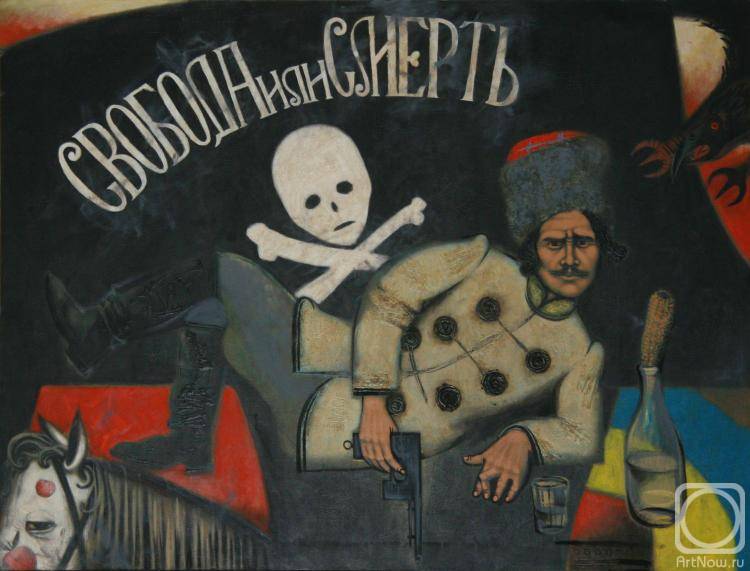
"Anarchist-Makhnov-Nabatov" single anarchism felt under a possibility of real implementation in the kingdom of Makhno, but being in contact with reality, turned into "socialism. The anarcho-Makhnovists fought against the commissar-power, in Ukraine they became powerlessly imperious ”(Universal magazine No. XXUMX).
Information